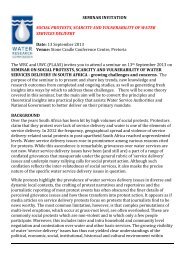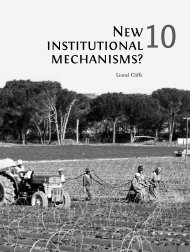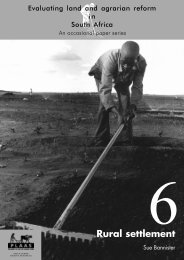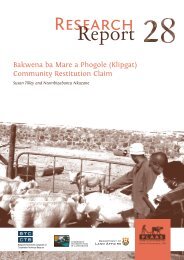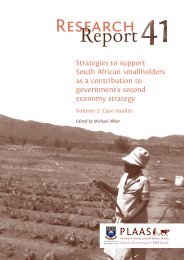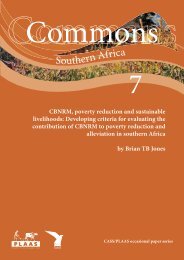A critical appraisal of South Africa's market-based land reform policy
A critical appraisal of South Africa's market-based land reform policy
A critical appraisal of South Africa's market-based land reform policy
You also want an ePaper? Increase the reach of your titles
YUMPU automatically turns print PDFs into web optimized ePapers that Google loves.
A <strong>critical</strong> <strong>appraisal</strong> <strong>of</strong> <strong>South</strong> Africa’s<br />
<strong>market</strong>-<strong>based</strong> <strong>land</strong> <strong>reform</strong> <strong>policy</strong><br />
money from other sources (interviews 3<br />
and 36). A number <strong>of</strong> the farmers with<br />
<strong>land</strong> at Manamead have access to other<br />
<strong>land</strong> in communal areas and run businesses<br />
such as butcheries. They clearly use<br />
the Manamead <strong>land</strong> as part <strong>of</strong> larger<br />
farming and businesses operations (Nefale<br />
2003a; Kalauba 2003; Wegerif 2003).<br />
According to the respondents, the<br />
Manamead farms have a carrying capacity 4<br />
<strong>of</strong> around 5–5.5ha per large stock unit and<br />
the Steilloop farms have a carrying<br />
capacity <strong>of</strong> 11–14ha per large stock unit.<br />
Information on carrying capacity was not<br />
available for the other projects. Some <strong>of</strong><br />
the beneficiaries had been informed <strong>of</strong><br />
these figures by the DoA, but others were<br />
not aware <strong>of</strong> the carrying capacity <strong>of</strong> their<br />
<strong>land</strong>. All <strong>of</strong> the farmers interviewed, except<br />
two, 5 have herds that exceed the carrying<br />
capacity <strong>of</strong> their farms. These herds exceed<br />
the carrying capacity by an average<br />
<strong>of</strong> 44%, raising a concern about the longterm<br />
sustainability <strong>of</strong> the farms.<br />
Markets<br />
The main product <strong>of</strong> all the farms acquired<br />
through LRAD and currently in use is<br />
cattle. The <strong>market</strong>ing and sale <strong>of</strong> cattle is<br />
primarily done through the Vleissentraal 6<br />
auctions at the nearest auction point from<br />
the farms. For the Manamead farmers this<br />
is only about 20km away, at Bandelierkop.<br />
The Steilloop farmers go to Baltimore,<br />
which is about 30km away, and sometimes<br />
travel further to auctions in Ellisrus and<br />
Potgietersrus, both about 100km away.<br />
The farmers are able to sell all the cattle<br />
that they take to these auctions, but not all<br />
were satisfied with the prices and treatment<br />
they receive. The majority <strong>of</strong> respondents<br />
had no problem with the auctions and<br />
some said they were happy to be able to<br />
compete and sometimes do better in terms<br />
<strong>of</strong> quality <strong>of</strong> cattle and price received than<br />
the white farmers (interviews 12 and 17;<br />
Kalauba 2003). However four respondents<br />
reported experiencing racism. There were<br />
reports <strong>of</strong> auctioneers using certain comments<br />
to indicate when cattle came from<br />
black owners and that these cattle then<br />
received lower bids (interview 11). One <strong>of</strong><br />
the respondents believes there is nepotism<br />
and noted that all the salespeople he has<br />
seen are white, except one who used to be<br />
there to sell livestock from state farms<br />
(interview 10).<br />
Most respondents said they get no<br />
assistance with the <strong>market</strong>ing aside from<br />
Vleissentraal supplying the calendars <strong>of</strong><br />
auction days and, in some cases, phoning<br />
to tell them about prevailing prices. Ms<br />
Morapedi, a farmer at Steilloop, used to get<br />
the auction dates from Vleissentraal, but<br />
has not received dates for the last year and<br />
now obtains the information from<br />
neighbouring farmers. Two respondents<br />
said the auction dates were provided to<br />
them by the DoA (interviews 12 and 13).<br />
Some <strong>of</strong> the farmers at Manamead<br />
slaughter their cows to sell the meat<br />
through their own butcheries. Mr Nenghovhela,<br />
who has a farm at Manamead,<br />
exchanges heifers for fully-grown cows<br />
from people in neighbouring villages. He<br />
then slaughters the cows and sells the meat<br />
in his butchery.<br />
Post-transfer support<br />
The only form <strong>of</strong> post-transfer support<br />
being received by the beneficiaries is<br />
agricultural extension services. There were<br />
mixed views on the availability and quality<br />
<strong>of</strong> these services. Of the 12 respondents<br />
who are engaged in production, nine said<br />
they had access to extension services,<br />
while three said they did not. Where the<br />
extension services are available, the visits<br />
<strong>of</strong> extension <strong>of</strong>ficers are largely on<br />
request, or to attend meetings. There are<br />
few regular visits and little time is spent on<br />
the farms providing practical advice or<br />
assistance. All four <strong>of</strong> the Steilloop farmers<br />
interviewed said extension services were<br />
available; the availability and quality <strong>of</strong><br />
services at Manamead seemed more<br />
doubtful; and Mr Kutumela said he had no<br />
support. Two <strong>of</strong> the Steilloop farmers were<br />
very positive about a particular extension<br />
<strong>of</strong>ficer, Mr Ngobeni, indicating the<br />
importance <strong>of</strong> the individual on the<br />
perception <strong>of</strong> the quality <strong>of</strong> services being<br />
<strong>of</strong>fered.<br />
38




